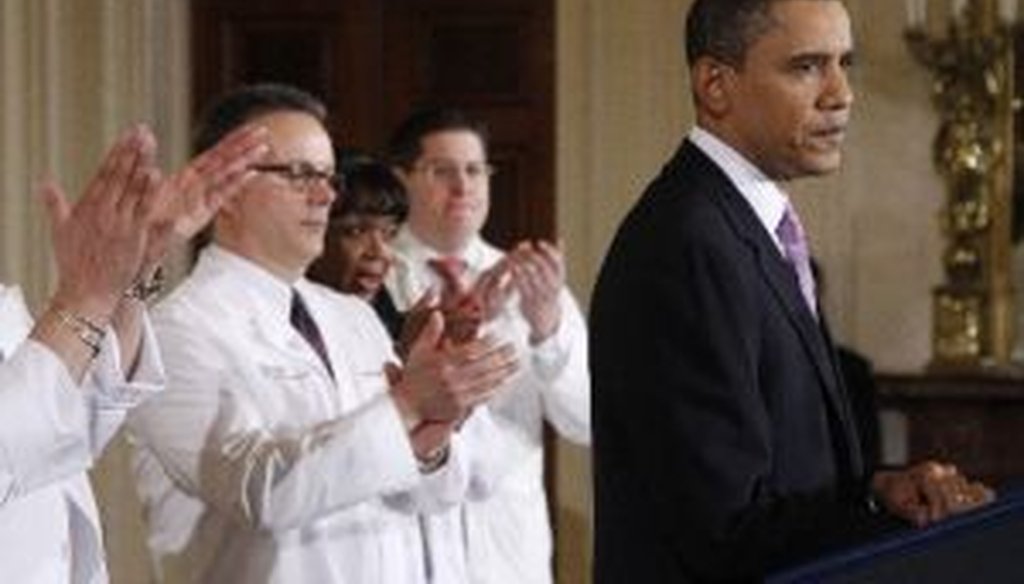Get PolitiFact in your inbox.

Would doctors like these supporters of the Affordable Care Act become "unelected bureaucrats" on a Medicare payments advisory board Republicans warn will take power over health-care decisions away from patients?
When Republicans in the U.S. House of Representatives voted March 22 to eliminate a a Medicare payment advisory board – a vote the Associated Press noted was really just "symbolic" – the rhetoric was flying.
Some representatives went a good deal farther than Tennessee’s own Marsha Blackburn, who nonetheless floated a statement about the Independent Payments Advisory Board taking "control" of health care decisions away from patients – and that we’ve ruled False.
Most news organizations wrote something similar to the AP about the vote – the Republiucans actually want the IPAB around as an issue through the November elections. It’s worth taking a closer look at the various statements that have been made and consider the actual statutory power IPAB does or does not have.
In our ruling on Blackburn’s claim, we noted three other similar claims that had previously been vetted:
PolitiFact National, on Oct. 12, 2011: "IPAB board is 15 bureaucrats who will decide for the nation, says Michele Bachmann." (False).
PolitiFact Georgia, on Aug. 2, 2011: "(Rep. Phil) Gingrey claims federal health care board can decide if you get dialysis, chemo." (False).
PolitiFact Ohio, on March 11, 2012: "Pat Boone says health care advisory board can ration care and deny Medicare treatments." (ridiculously false, so Pants On Fire).
The Boone item lists several other previous PolitiFact items debunking statments about medical savings in the Affordable Care Act in general and the role of the IPAB in particular (see here, here, here, here, here and here).
Even with those fact checks showing a huge overreach in trying to scare people about the IPAB’s actual power, the vote brought forth statements that went much farther than Blackburn’s toeing of the Republican talking-points line on the IPAB.
Georgia Republican Jack Kingston even invoked the "death panels," which of course have been the subject of many previous Pants On Fire ratings from PolitiFact (this link takes you to a page that shows 59 rulings or stories relating to death panels). That accusation, made most famous by Sarah Palin, claims the Affordable Care Act would allow the government to withhold life-saving care from seniors.
"It's not necessarily a death panel, but it is a rationing panel and rationing does lead to scarcity for some," Kingston said in trying to describe (inaccurately) the IPAB. "Who's going to get the needed treatment, an 85-year-old or the 40-year-old with children?"
See the various links above to see why Kingston’s rhetoric doesn’t match reality.
One curious dynamic to the political contours of the debate is this -- on the one hand, Republicans say they prefer the private insurance market yet have mobilized in opposition to a provision in the the new health-care law that tries to create cost-savings mechanisms similar to private insurance.
So rather than look just at what some fear the IPAB might do, it seems instructive to look at what private plans already do to limit their costs.
Most insurance companies, for example, issue formularies – a list of the prescription medications they will pay for and at what rate. If you want a specific brand-name version of a cholesterol-lowering drug, it may be covered or it may be charged at a different rate than cheaper generics, perhaps prompting the cost conscious to skip its use altogether. Certain medical procedures – heart transplants, say – aren’t covered, even when medically necessary.
These decisions, made in insurance company cubicles for the corporate bottom line, it seems to us, would "control…health care decisions" a lot more directly than the overarching policy prescriptions of a scientific board.
Our Sources
See story for relevant links.






















































